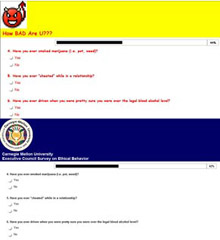How Websites Make You Spill Your Secrets
Researchers at Carnegie Mellon University have found that the appearance of website has a big effect on how honestly people answer personal questions put to them by the site. But paradoxically, it turns out we’re more likely to spill our secrets on websites that appear less reputable. The way a website phrases questions also affects our willingness to disclose revealing information, the researchers found.

The findings could have implications for privacy online–affecting how marketers approach consumers, and how policymakers try to protect consumers from privacy abuses.
Companies are constantly collecting information about people online: Google stores billions of search queries every day, and Facebook tracks the interests and social habits of millions of users. Much of the information collected online comes from tracking how people behave, but some is volunteered willingly.
The Carnegie Mellon researchers designed several tests to determine what encourages people to give out personal information online. “We’re interested in particular in the dichotomy between what people say they desire in terms of privacy, and what we all actually end up doing online,” says Alessandro Acquisti, an associate professor of information technology and public policy at Carnegie Mellon. Acquisti was involved in the work along with doctoral candidate Leslie John and economics professor George Loewenstein.
In work to be published in the Journal of Consumer Research, the researchers asked volunteers an identical set of personal questions using three different-looking websites. The questions included “Have you ever ‘cheated’ while in a relationship?” and “Have you ever driven when you were pretty sure you were over the legal blood alcohol level?”
One site displayed an official-looking logo, formal fonts, and staid colors. Another site was designed to appear neutral. And the third used lurid colors, less professional-looking fonts, and a cartoonish devil icon. The researchers found that people were nearly twice as likely to admit to having engaged in “illicit” or “socially questionable” activities when presented with questions on the third site–the least reputable-looking one. About a third of all participants also gave up their e-mail addresses, and about half of those e-mail addresses were easy to trace back to the person’s real identity.
While this behavior might seem irrational, the researchers say their volunteers may have had the impression that the least official-looking website would be least likely to store or use their personal secrets.
Marketers could see this behavior as a good thing, Acquisti says. They could exploit it by designing websites that encourage visitors to spill more information. On the downside, sites with an unprofessional design are more likely to lack privacy protections or sell their users’ personal information to spammers.
The Carnegie Mellon group found that the phrasing of questions also affects how much information people will divulge. For example, people clammed up when asked point-blank if they had ever gone on a date just to make someone jealous. But they replied more openly when asked “If you have ever gone on a date just to make someone jealous, how unethical do you think it was?” Acquisti says such phrasing can distract people from the fact that they’re divulging personal information.
“Our lesson here is that it’s difficult for all of us to navigate issues of privacy and choose the optimal balance of revelation and disclosure, because little contextual cues can dramatically change our propensity to reveal,” Acquisti says.
Joseph Bonneau, a University of Cambridge researcher who has shown that social networks get more data from users when they bury their privacy settings, says the Carnegie Mellon group’s work establishes important facts about how people reveal information. “They’ve documented it very strongly, I think,” he says.
Bonneau believes these findings will prove important in the context of regulations covering what information marketers can collect from users and how they disclose what will happen to that information.
But Soren Preibusch, another University of Cambridge researcher who studies online privacy, says it’s often in a company’s best interests to guard consumers’ privacy. He says his own research has shown that consumers are willing to spend much more money on a company’s products when they trust that company to protect their privacy. Sites that were perceived as “privacy-friendly” could sell products at prices an average of 80 percent higher than firms perceived as “privacy-unfriendly,” he found.
Keep Reading
Most Popular
Large language models can do jaw-dropping things. But nobody knows exactly why.
And that's a problem. Figuring it out is one of the biggest scientific puzzles of our time and a crucial step towards controlling more powerful future models.
The problem with plug-in hybrids? Their drivers.
Plug-in hybrids are often sold as a transition to EVs, but new data from Europe shows we’re still underestimating the emissions they produce.
How scientists traced a mysterious covid case back to six toilets
When wastewater surveillance turns into a hunt for a single infected individual, the ethics get tricky.
Google DeepMind’s new generative model makes Super Mario–like games from scratch
Genie learns how to control games by watching hours and hours of video. It could help train next-gen robots too.
Stay connected
Get the latest updates from
MIT Technology Review
Discover special offers, top stories, upcoming events, and more.